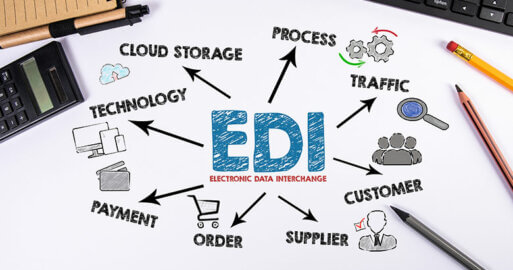Purchase and Supply Processes in the Automotive Industry

In these times of fragile supply chains, it is imperative for all parties in an automotive supply chain to ensure a reliable supply of materials. And this is why efficient supply processes play such a key role in the industry. Read on to discover the advantages of call-off contracts and electronic data exchange.
Call off contracts – from schedules to shipping notifications
In a classic purchasing process, a customer makes an enquiry. This is followed by a quotation from the supplier, which ideally encourages the customer to place an order. The supplier confirms the order before delivering the goods, which are accompanied by a delivery note. Finally, the customer receives and settles an invoice. This is an established purchasing workflow, tried and tested for placing and receiving individual orders.
However, purchasing processes in the automotive industry often involve serial components, parts that are used again and again in production. It would be unnecessarily costly and time-consuming to trigger and carry out the classic purchasing process each time a serial part was required.
To counteract this problem, serial parts for the automotive industry are ordered through a call-off contract. Also referred to as a blanket order, it does away with the need for individually placed orders and individual order confirmations. Instead, the customer and supplier enter a framework contract agreeing on a total quantity of material to be kept ready within a fixed period of time. The supplier receives call-off schedules from the customer at regular intervals, essentially an exact delivery schedule with delivery dates and quantities to be delivered. These enable the supplier to plan his production and logistics needs effectively, while also making the whole purchasing process more transparent and manageable for the customer.
Call-off schedules are sent to the supplier on a weekly, possibly even daily basis. They specify what material is to be delivered, and contain rolling updates on cumulative order quantities and forecasts. Each new call-off schedule automatically supercedes the preceding call-off schedules.
It would be possible for suppliers to manually process and update these call-off schedules in their ERP system. However, the only sensible way to run this at scale for several parties and parts is through electronic data interchange (EDI) along the automotive supply chain.
How does WebEDI help make automotive supply processes more efficient?
For smaller companies upstream who don’t have their own EDI setup, large car manufacturers and OEMs can still offer browser-based access to their EDI systems through WebEDI. All your suppliers need to use the WebEDI portal is an internet connection, and they too can benefit from the advantages of EDI.
As a rule, call-off schedules are sent to a supplier electronically in a format such as VDA4984, VDA4905, EDIFACT DELFOR or ANSI830. This lets the supplier automate data processing and update his ERP system, by for example employing an integration hub. The updated call-off schedule in his ERP system means he can now prepare the next batches of components to be called off. And this is where an electronic document designed precisely for this situation comes into play – the Advanced Shipping Note (ASN).
Since deliveries are made at a high frequency in a call-off process, customers ask their suppliers to provide delivery notes electronically. This too requires – or prescribes – common industry standards such as VDA4987, VDA4913, EDIFACT DESADV or ANSI856. An advanced shipping notice helps customers plan their own production more effectively.
An electronic shipping notification also has another advantage for a customer. It makes it easier to log the delivery in their ERP, where they can easily check the delivery receipt against the data from the advance shipping notification. In the automotive industry, a shipping notification also contains packing information including the number of packages. This information, combined with the additional details on the packages (master, single, quantity, weight, etc.) partially, or even fully, automates the goods receipt process.
This regular, standardised data exchange aims to further stabilise material flow from the supplier to the customer. Since any expected delivery fluctuations can be quickly communicated, it is possible to avoid the so-called bull-whip effect along the supply chain. However, this only works with electronic data interchange. Manual processing of this regular, complex information would simply be too slow to have the desired effect.


How can SEEBURGER help?
SEEBURGER has been developing software products and services to enable efficient delivery processes in the automotive industry since 1986. We are a global B2B software and IT consulting company and are a market leader in Germany with our EDI solutions. We provide these on a single, scalable platform, the SEEBURGER Business Integration Suite (BIS). The modular product design lets you optimize your supply chain management by simplifying complex IT landscapes, standardizing processes and increasing efficiency through a smooth flow of data. Our automotive supply chain solutions are provided in the cloud, as a hybrid solution or on-premises.
Whitepaper
Take a look at our white paper 10 Capabilites for Driving Rapid Innovation Across the Automotive Value Chain to discover more about our solutions for the automotive industry.
DownloadThank you for your message
We appreciate your interest in SEEBURGER
Get in contact with us:
Please enter details about your project in the message section so we can direct your inquiry to the right consultant.
Written by: Alex Jende
Alex Jende started his career as a student at SEEBURGER in 2008. After completing his Master's degree in Information Management in 2010, he started full-time as a consultant for logistics solutions at SEEBURGER. His first focus was the realization of international customer projects in the field of automotive logistics. From 2015 he was responsible for the product management of the Logistic Solution Professional and from 2020 additionally for the Supplier Portal and thus the area of WebEDI for supplier connectivity at SEEBURGER. Alex relaxes as often as possible with extensive jogging tours around his home in Leipzig. Most weekends he goes back to his hometown Magdeburg. As a passionate soccer fan, he never misses a game of his club, the 1. FC Magdeburg, along with his family. His favorite way to spend his vacations is hiking in the Alps.





